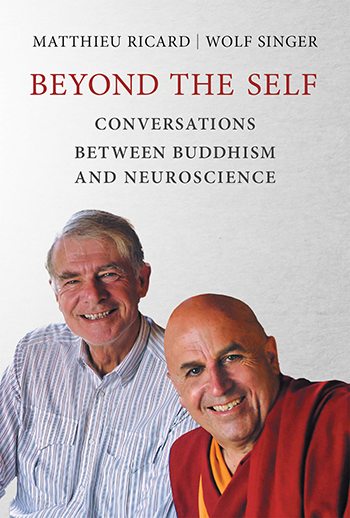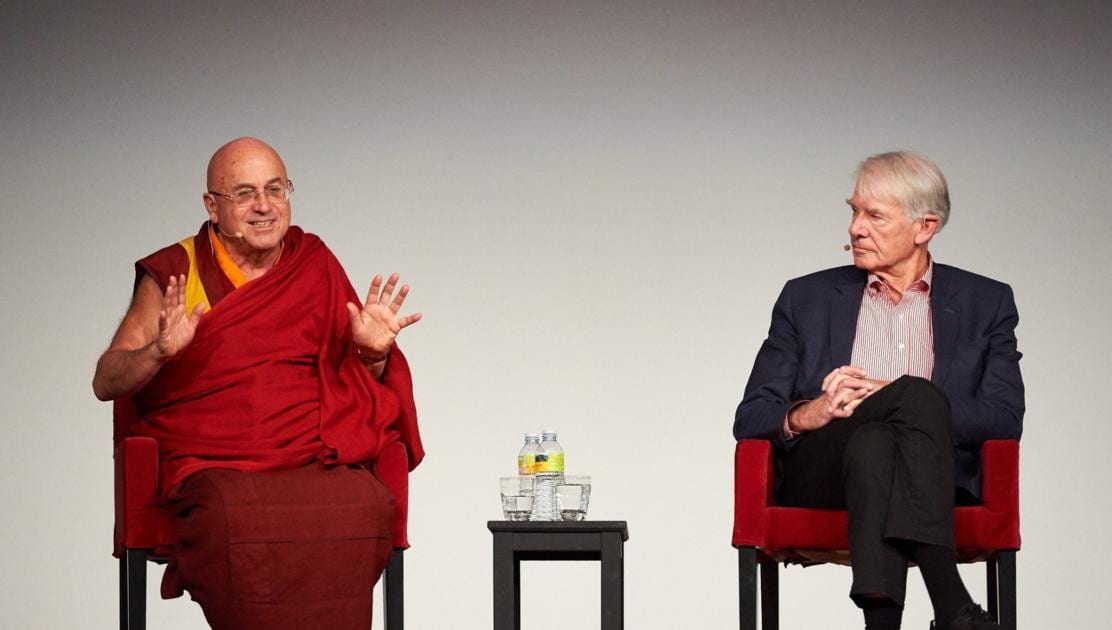The Responsibility to Change
A Conversation with Matthieu Ricard and Wolf Singer
By The Garrison InstituteBuddhism shares with science the task of examining the mind empirically; it has pursued, for two millennia, direct investigation of the mind through penetrating introspection. Neuroscience, on the other hand, relies on third-person knowledge in the form of scientific observation. In this conversation, which appears in the recent book Beyond the Self: Conversations Between Buddhism and Neuroscience, Matthieu Ricard, a Buddhist monk trained as a molecular biologist, and Wolf Singer, a distinguished neuroscientist, offer their perspectives on human behavior, moral values, and the responsibility that individuals and societies have to become more just.
Matthieu Ricard: We may have no choice now about what we are; otherwise, everyone would certainly choose to be someone filled with admirable qualities rather than a criminal or a sex addict, an object of contempt for others. We may also have no choice about the way we behave in the spur of the moment. But we have the responsibility to change when change is desirable, and we are responsible, to some extent, for not having engaged in a process of transformation in the past.
When you recognize that you are not in control of your emotions and it is causing you suffering, it is your responsibility to escape from this trap.
Let’s take the example of someone who has a strong compulsion to do something. As you say, when she is overwhelmed by her drives, she may not have much immediate choice or sufficient capacity to control her actions. As Oscar Wilde said, “I can resist everything, except temptation.” But if that person knows that she has traits or tendencies that are detrimental to others’ and her own well-being and has experienced her lack of control in the past, suffered from it, and caused others to suffer from it, she could take these experiences as opportunities to change. There are certainly times where the circumstances are such that the compulsive tendencies of that person are not expressed in such a strong way. Wouldn’t that have been the time to do something about these traits by training the mind through using proper antidotes or seeking help from people who could offer means and methods to achieve that change? Doing something when it can be done and seeking the right kind of help is part of our global responsibility.
We might behave like robots in the spur of the moment, but we are not robots over the course of our life. Because everything is the result of causes and conditions, when all the causes for an event, whether in the brain or elsewhere, are gathered, that event has to happen. Yet over time we can generate new causes and conditions and influence this dynamic process. This is the virtue of mind training and of brain plasticity: Being exposed to new conditions induces brain changes, including in so-called unconscious processes.
 One may disapprove of an action, but people are not intrinsically evil, although their actions may be evil. However people think and behave is the result of a dense web of causes and conditions that are changing naturally and can be further changed through specific interventions. Every person is more or less confused, more or less deluded or “sick” in his or her mind, and we should approach everyone as human beings who have gone through countless experiences under countless outer and inner influences.
One may disapprove of an action, but people are not intrinsically evil, although their actions may be evil. However people think and behave is the result of a dense web of causes and conditions that are changing naturally and can be further changed through specific interventions. Every person is more or less confused, more or less deluded or “sick” in his or her mind, and we should approach everyone as human beings who have gone through countless experiences under countless outer and inner influences.
Blame often proceeds from ignorance, contempt, and lack of compassion. A physician does not blame his patients, even if they have behaved in ways that have harmed their health; he tries to find ways to cure them, to skillfully help them change their habits. When someone harms others, he should be prevented from doing so with adequate, efficient, and measured means, but he should also be helped to change his harmful behavior.
Instead of engraving judgments about people in stone, we should view them—and ourselves as well—as flowing, dynamic streams that always have a genuine potential for change.
When Nelson Mandela was asked how it was possible that he made friends with his jailers during his 27 years of detention, he answered, “By bringing out their good qualities.” When asked whether he thought that all people had some good deep within them, he answered, “There is no doubt whatsoever, provided you are able to arouse the inherent goodness.”
Wolf Singer: You are absolutely right. Human beings possess a wide spectrum of behavioral dispositions ranging from the extremes of cold-blooded murder and genocide to altruistic self-sacrifice. There are several ways to bias behavioral outcomes. One is to change the outer imperatives, to design socioeconomic systems that reward behavior that contributes to the stabilization of the system and sanction destructive actions. In a sense, this resembles an evolutionary process that eventually leads to the emergence of social interaction networks whose architectures favor adapted behavior. However, humans also go through a process of cultural evolution in which the transmitted traits are encoded not in genes but in codified moral conventions that get expressed in social conduct and habits. The important difference is that cultural evolution has an “intentional” component because we intentionally design the interaction architectures that impose the constraints for adaptation and selection.
Another strategy is to codify moral values and design education systems by which these values can be transformed into action-constraining imperatives that are internalized by individuals and transmitted from generation to generation. These are then complemented by normative systems that put further constraints on the range of tolerated behavior. If I understand correctly, there is yet another option, apparently favored by the Buddhist traditions, consisting of attempts to alter the behavioral disposition of individuals through mindfulness training. In all cases, the goal would be to eventually obtain as much agreement as possible between outer imperatives and inner dispositions, both forces being directed toward the good. The functional architecture of our brains can be modified by education, positive and negative experiences that act as rewards and punishments, insight, training, and practice. The incentives to change are provided by the reward systems in our brains.
Our brains seem to be endowed with systems that are capable of identifying brain states as consistent, coherent, congruent, and harmonious or conflicting and unresolved. We still don’t know what the neuronal signatures of these states are, but we strive for the former and try to overcome the latter.
Ricard: Those words—“coherent,” “harmonious,” and so on—refer to categories of experience not neuronal processes. This shows that to make sense of all this, you need to resort to your own subjective experience.
Singer: Not necessarily. Subjective feelings of harmony must be associated with particular neuronal states, and it is possible that coherent neuronal activity patterns evoke positive feelings. As mentioned before, we still ignore the signatures of activation patterns that correspond to solutions and conflict-free internal states. Maybe such states are actually characterized by a high degree of coherence. Because we are social beings deeply embedded in our cultural networks and permanently exposed to the judgments of others, the criteria of consistent internal states are derived from the heritage of biological evolution as well as the imperatives that emerged from cultural evolution, the moral standards that we are supposed to meet and that get installed in the architecture of our brains by education, observation of social interactions, and life-long exposure to social rewards and sanctions. Once internalized, these experiences assume the status of internal goals, as self-imposed imperatives that need to be reached to arrive at consistent, nonconflicting internal states—just as we strive for the satisfaction of biologically motivated goals such as satiety and reproduction. It all depends on the nature of the values and norms that our cultures impose on us and that, once installed in the functional architecture of our brains, act as goals and imperatives.
Values and norms installed early in life, before the development of episodic memory, remain implicit and deeply anchored in our subconscious, and therefore they are experienced as integral parts of our personality. They are experienced as our own goals, drives, convictions, and moral judgments. Set points imposed on us during later life are more often explicit; we are conscious of their origin and therefore experience them as imposed social constraints that need not necessarily agree with our internal convictions. Nevertheless, we wish to comply with them to reduce conflicting states in our brains and strive for a coherent state.
Ricard: Surrounding cultures are not only imposed on us. We also fashion our culture through our thoughts, personal transformation, and intelligence. Individuals and cultures are like two blades that sharpen each other. Because both contemplative science and neuroscience have shown us that it is possible to train our mind and gradually modify our traits, the accumulation of individual changes can also shape a new culture.
Singer: Obviously we create cultures, and they in turn act on us. I also tend to agree that it is possible to override some of the inherited and early imprinted traits not only through cognitive control—a strategy that we all apply in adulthood—but also through procedural learning by simply developing new and better adapted habits. I see an analogy here with the acquisition of new motor skills, which after sufficient training can be executed without cognitive or conscious control.
Ricard: This is quite similar to what contemplatives say. In the beginning, any practice is contrived and unnatural. With familiarization, we begin to do it well and with ease, and, finally, it becomes fully part of us.
Singer: I could therefore imagine that it is possible to also change certain traits with practice. Resisting a particular temptation or engaging in an altruistic act, both of which would be rewarded by social recognition, initially requires cognitive control and the investment of attentional resources. It is conceivable that practicing these novel attitudes over and over again could eventually anchor them in brain structures that execute their functions without requiring cognitive control. In this case, the novel behavior would become more and more a new trait of character. We observe such changes in attitude in biographies, and it would be interesting to examine experimentally the extent to which these changes can be induced, even in adults, by self-paced practice and training, or whether they are more likely the result of singularities, such as trauma or enlightening experiences. The evidence that wisdom grows with age testifies that accumulating experience can change character traits, so there is hope that training compassion and generosity can be effective.
Ricard: If a certain number of individuals can thus undergo personal change, this will naturally induce gradual changes in the surrounding culture—
Singer: —which will have a reciprocal impact on individuals. This reciprocity could, at least in principle, initiate self-reinforcing progress toward better societies, just as, in the opposite direction, aggression and revenge initiate vicious circles that have deleterious effects on societies. We should exploit both options for change: working on the individual and designing interaction architectures for societies that provide incentives for peaceful behavior.
Excerpted from Beyond the Self: Conversations between Buddhism and Neuroscience by Matthieu Ricard and Wolf Singer. Published by The MIT Press, November 2017. Copyright 2017 Allary Editions. All rights reserved.
Photo courtesy of Olivier Adam

Is it available in French ?